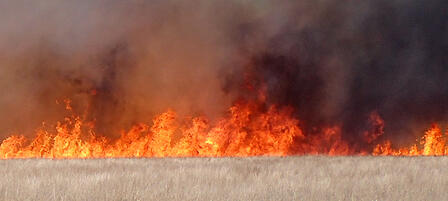Prevent Wildfires

PRATT – As Kansas endures another dry winter, the Kansas Department of Wildlife, Parks and Tourism (KDWPT) cautions anyone spending time outdoors to be aware of fire danger. One only has to look at the past two springs to be reminded of the threat posed by wild fires.
In March of 2016, an enormous wildfire burned more than 400,000 acres in Oklahoma and Kansas. Dubbed the Anderson Creek Fire, it burned nearly 300,000 acres of Barber County alone, killing more than 600 cattle and destroying 16 homes and structures. Rough terrain and thick grass, combined with dry conditions and high winds, created a frightening fire that was almost impossible to control. It was billed as the largest wildfire in Kansas’ history.
However, just a year later, it would lose top billing. The Starbuck Fire burned through northern Oklahoma and into Clark County on March 5, 2017 – a monster, even compared to the Anderson Creek Fire. Pushed by 50-60 mph winds and fed by 6 percent humidity and heavy fuel, the fire was a living nightmare for Kansans living in the ranching and farming communities of Clark and Comanche counties. The Starbuck Fire burned 500,000 acres in Clark County and 200,000 acres of Comanche County. The speed and ferocity of the fire made it deadly. One person was killed and more than 6,000 cattle burned to death. Dozens of homes and buildings were reduced to ashes. It also killed wildlife, including pronghorns, deer and coyotes.
While the Starbuck Fire roared, dozens of others burned around the state, including those in Reno, Ellis, Rice and Rooks counties, stretching rural firefighting resources thin. It will take years to recover and rebuild.
While many followed the news last spring and are familiar with these stories, they are worth repeating to keep fire danger fresh in Kansans minds. KDWPT staff remind anyone spending time outdoors this winter to be especially careful. Never throw burning cigarettes from moving cars. Never drive through tall grass; hot mufflers or catalytic converters can ignite dry grasses. And avoid campfires and burning trash until measurable precipitation falls.
-30-









